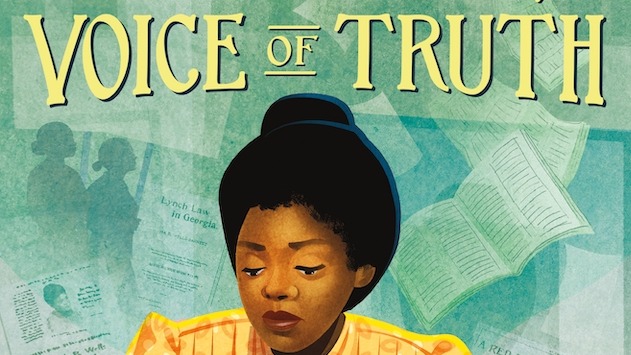Michelle Duster writes a children’s book about her great-grandmother, Ida B. Wells
By Julie Danielson, originally published on Chapter 16 on February10, 2022
The work of activist, author, and educator Michelle Duster, as she likes to describe it, is to “unerase Black women.” Ida B. Wells, Voice of Truth, her new book, does just that. This picture book biography profiles the life and work of her great-grandmother, the journalist and civil rights advocate Ida B. Wells.

“Some people refer to my great-grandmother Ida B. Wells as a ‘boss,” Duster writes in the book’s first lines. Illustrator Laura Freeman depicts a photo album on this opening spread and, throughout the book, captures pivotal moments in Wells’ life. Before we even read about her birth, Duster offers readers Wells’ record of extraordinary accomplishments that changed the very course of history, including her work as an “educator, a journalist, a feminist, a businesswoman, a newspaper owner, a public speaker, a suffragist, a civil rights activist, and a women’s club leader.”
Duster also writes that, as a founding member of multiple organizations for Black people (including the NAACP), Wells, who was born into slavery in 1862, “challenged the racist and sexist norms of her time that often involved violence and terror” and fought for justice for nearly five decades. Wells first came to prominence as a journalist in Memphis, where violent opposition to her work chronicling lynching forced her to leave the city permanently and settle in Chicago, Duster’s hometown.
As an educator, Duster is accustomed to working with young people and talking to them about the legacy of her great-grandmother. She has noticed that most students only know a small part of Wells’ story. “Ida’s life was so multi-dimensional,” Duster told Chapter 16 via phone. “Some people will know about her work with the suffrage movement, but they don’t know much about her as a journalist. Very few people know about the work she did with the Negro Fellowship League, which was considered social work. People are shocked to hear that she was a parole officer! There were just so many different things that she did. It’s very expansive.”
Duster’s new picture book will work to change that, as it’s a detailed and comprehensive look at Wells’ contributions to American history. And it marks a new audience for Duster, who has edited books of Wells’ original writings, written about her great-grandmother’s life for teens, and in 2021 published the biography Ida B. the Queen: The Extraordinary Life and Legacy of Ida B. Wells. Duster describes her writing, in part, as providing perspective on her great-grandmother’s life compared to her own. “I’m a woman living in the same country a hundred years after her,” said Duster. “Where have things gone? Did she achieve her goals for her descendants?”
Duster grew up with consistent reminders from her family of her great-grandmother’s values, yet she was shielded from the violence this worked centered. “We were told in age-appropriate stages,” she explained, “that she wrote about lynching. And I do believe that my grandmother tried to shield us from some of the gory details. But I didn’t really know the extent of the violence that was involved in lynching until I started working on projects about her.”

Marveling at her great-grandmother’s strength in the face of such brutality, Duster notes that one can only speculate about its source. “Her parents, from what I understand,” Duster said, “were people that really took full advantage of all the newfound rights that formerly enslaved people had right after the Civil War. They were enthusiastic about education. Everything that I’ve learned about Ida through the research I’ve done is that she grew up with a sense of possibility and excitement about where you can go as a free person. And she had a level of indignation about that being slowly stripped away.”
Duster believes that inherent in the work of unerasing Black women is the need to speak truthfully about America’s racism, past and present, and she hopes her book will not receive opposition from people across the country working to ban such texts in classrooms. “I feel that it’s a disservice to everybody to not be honest about our history,” she said. “Nobody’s making this stuff up. There are people still alive today who have lived through some of these domestic terrorism incidents, and there’s no way that the past is not connected to the present. I hope that this country figures how to have an honest and open dialogue that is based on reality, one that will actually help us heal. Because I think we will never be whole as a country unless we can actually deal with the truth.”
Duster would also like to see her picture book reach all children. “My hope,” she explained, “is that boys will be equally inspired by the story of someone who happens to be a woman. She spoke up for justice and equality and she used the tools she had available at that time, which was the newspaper — and I don’t think she could have used it any better. My hope is that all children will be inspired by the idea of using your voice to stand up for what you feel is right.”
Julie Danielson, co-author of Wild Things! Acts of Mischief in Children’s Literature, writes about picture books for Kirkus Reviews, BookPage, and The Horn Book. She lives in Murfreesboro and blogs at Seven Impossible Things Before Breakfast.

